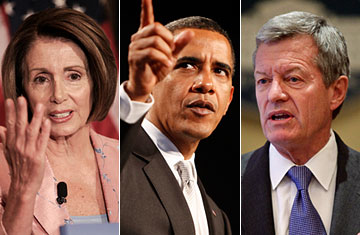
From left: House Speaker Nancy Pelosi, President Barack Obama and Senator Max Baucus are among the leaders pushing to overhaul the nation's health care
President Barack Obama did his best to keep health-care reform on track with his July 22 press conference, but after months of choosing to let Congress manage the day-to-day details, there is only so much he can do to speed along the process. He continued that effort on Thursday, dispatching chief of staff and former House Democratic Conference chairman Rahm Emanuel to Capitol Hill to try to ease the concerns of the Blue Dogs, a group of key, fiscally conservative Democrats who are balking at what they view as the high long-term costs of House Speaker Nancy Pelosi's health-care proposal.
Pelosi is racing to deliver at least one completed health-care bill to Obama ahead of the August recess. The House is set to leave at the end of next week, though the Speaker has said she is willing to keep them an extra week to get the bill done. Her work was made all the more crucial after Senate majority leader Harry Reid confirmed on Thursday that the upper chamber will not be able to meet the President's deadline of delivering a bill before the August break. "I am more confident than ever," Pelosi said on Thursday. "When the bill is ready, we will go to the floor, and we will win."
The Blue Dogs — a bloc of 52 votes without which Pelosi cannot pass legislation unless she lures Republicans to take their place — immediately disagreed. In truth, Pelosi could, with enough pressure, probably pass just about anything out of the House. But votes that rely on her playing the heavy with her own caucus come with a high price. Joked Representative Charlie Melancon, a Louisiana Democrat and Blue Dog: "We're going to need some orthopedists around here to take care of the broken bones and twisted arms."
In his most hands-on involvement to date, Obama earlier this week helped the Blue Dogs overcome a big sticking point: the formation of an independent commission to oversee Medicare payments, a role presently filled by Congress. The Blue Dogs, however, say they have a list of nine other issues; in his meeting with them on Thursday, Emanuel tackled concerns over regional disparities in Medicare reimbursements.
Pelosi faces two hurdles in giving Obama at least a partial victory before the dog days of August. She needs to get the legislation out of the House Energy and Commerce Committee, which is stacked with Blue Dogs and remains the only one of the three health-related committees in the House that has yet to pass a bill. On Thursday, for the third straight day this week, committee chairman Henry Waxman postponed a meeting to work on the bill because of the Blue Dogs' opposition. Assuming the Speaker can get it out of the committee, she still has to persuade an estimated 20 Democrats — either Blue Dogs, centrist New Dems or nervous freshmen — in order to pass the measure on the floor.
Across the Capitol campus in the Hart Senate office building, members of the Senate Finance Committee gathered to hear from Douglas Elmendorf, head of the Congressional Budget Office (CBO), who last week testified that the Democratic bills as currently constituted would do little to slow down the rising cost of health care. The working group of three Republicans (Iowa's Chuck Grassley, Maine's Olympia Snowe and Wyoming's Mike Enzi) and three Democrats (chairman Max Baucus of Montana, Kent Conrad of North Dakota and New Mexico's Jeff Bingaman) has come under fire for taking too long to reach a consensus, with Baucus in particular being criticized by fellow Democrats for bending over backward to win token GOP support.
"This is complicated stuff," lamented Conrad, the Senate Budget Committee chairman. "I'd rather we take our time to get it right." Democratic staff also noted that it is essential to avoid another embarrassing CBO score, and so participants have been focusing on how to bring down long-term costs. Reid has given the group two weeks to overcome their differences on the key remaining sticking point — how to finance the overhaul without adding to the deficit — and report out a bill. The Senate leadership will then spend the monthlong summer break marrying the Finance bill with one produced by the Health, Education, Labor and Pensions Committee earlier this month to produce a final version in September.
As complicated and confusing as that may sound, it is still only the beginning. If something eventually does pass the Senate, it would have to be combined with the House version to produce a final bill. Health-care reform is a messy, messy process. There are 11 committees of jurisdiction, three bills and dozens of interest groups — all of which seem totally disconnected from the actual pain and treatment of patients. It's so complicated, in fact, that it can make one of the most eloquent guys on earth — Barack Obama — sound awkward, as he did during Wednesday's press conference, fumbling around with generalities and jargon. As one Senate Democratic aide said, "Now you know how frustrated Congress has been with the Obama Administration's lack of clarity and involvement in the process."
— With reporting by Sophia Yan / Washington
